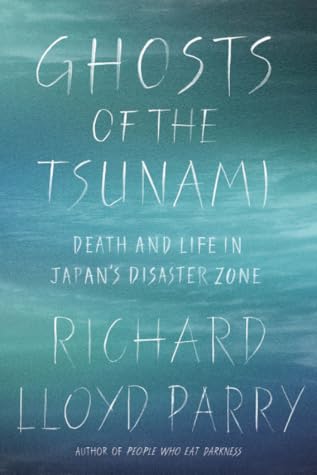More on this book
Community
Kindle Notes & Highlights
Read between
June 18 - June 24, 2023
Something is moving across the landscape as if it is alive, a brown-snouted animal hungrily bounding over the earth. Its head is a scum of splintered debris; entire cars bob along on its back. It seems to steam and smoke as it moves; its body looks less like water or mud than a kind of solid vapor.
The earthquake and tsunami caused more than $210 billion of damage, making it the most costly natural disaster ever.
But she was sustained, like many in her situation, by the simple instinct that, whatever was happening to other people, it was impossible—in fact, it would be ridiculous—for her own family to be extinct. Insupportable, soul-crushing, unfathomable—but also just silly.
This harshly illuminated clarity was the opposite of consoling. It pierced, rather than smothered, and left nowhere to hide.
Lulled by clichés about “serene” old people, I had assumed that attachment to life diminishes with age. But here was an extreme example of the opposite: an ancient man fending off death with javelin and discus. It was this—the urge to stay on his feet at all costs—that drove his athletic achievements. “The most important thing of all is to stay supple and flexible,” he said. “The moment you will be most stiff is when you die—you never get stiffer than that. So you’ve got to sleep well, eat well, and keep moving.” And all of this made the facts of his eventual death all the more pitiful.
After the cremation—well, I’m usually healthy, but I became ill. I couldn’t get up. I stayed in bed for three days. And I started thinking and thinking, and I became very suspicious about the circumstances in which we lost our daughter. I knew that this was a great natural disaster, and I assumed at the beginning that there must have been many other cases like this, other schools where the same thing happened. But why did I never hear of them?
“It has always made perfect sense in Japan as far back as history goes to treat the dead as more alive than we do … even to the extent that death becomes a variant, not a negation of life.”
When grief is raw, the presence of the deceased is overwhelming.
I pictured the image that Sayomi had called to mind: an arched stone bridge collapsing; masonry crashing into a river. She went on: “Nothing is capable of changing the situation. It’s not about the passing of time. It’s not about kind words. It’s not about psychological support. It’s not about money. None of that can change anything. There’s a space that is empty and that will never be filled.”
It was another enactment of the ancient dialogue, its lines written centuries ago, between the entreating voices of women and the oblivious, overbearing dismissiveness of old men.
But Konno found that it had left him with an indifference to mental hardship, and an absence of trepidation of any kind. He had no fear, of life or of death. He was like a man who had suffered a dangerous disease, to survive with complete immunity to future infection. The prospect of his own extinction—now, soon, or far in the future—was a matter to him of no concern at all.
“Far from being dull to the dangers, acute awareness of them gives Tokyo people’s lives tone and brio,” wrote Popham, during this same period. “The satisfaction of being a cog in the most elaborate and well-oiled machine in the history of the world is given an almost erotic twist by the knowledge that the machine is poised over an abyss.” Tokyo, he concluded, is “a city helpless to save itself, and reconciled at some quite deep level to destruction and loss of life beyond all but the nuclear nightmares of other cities.”
It is easy to imagine grief as an ennobling, purifying emotion—uncluttering the mind of what is petty and transient, and illuminating the essential. In reality, of course, grief doesn’t resolve anything, any more than a blow to the head or a devastating illness. It compounds stress and complication. It multiplies anxiety and tension. It opens fissures into cracks, and cracks into gaping chasms.
In North America and Europe, there is no lack of odious and incompetent leaders; but there is a sense of creative friction and of evolution, of a political marketplace in which ideas and individuals less popular and effective yield, over time, to those that prove themselves fitter for purpose, and where politics—even if it has its wrong turns and dead ends—is at least in constant motion.
Takahiro said, “Everything made by men will be destroyed by nature in the end. Mountains and river, the creations of nature—they will remain. Everything human, that will go. We need to reconsider the respect we give to nature.”
So they understood how I felt. And they talked to me normally—they treated me like an ordinary person. With the other families, I was always aware of the way they were looking at me and thinking about me—that they saw me as the most tragic one of them all. And that just made me feel worse.”
She did not want to be defined by her loss, but she did not want to be evasive about it, either.


